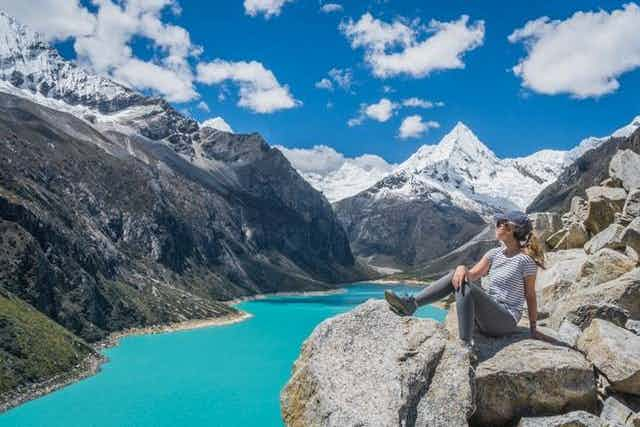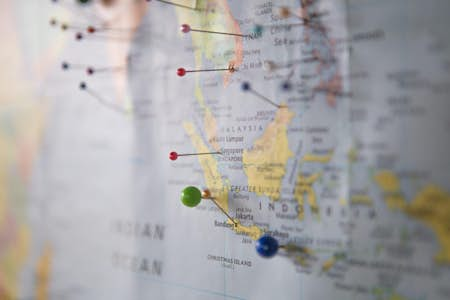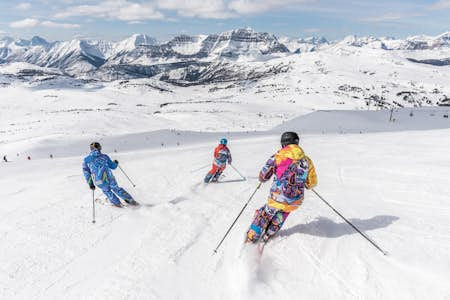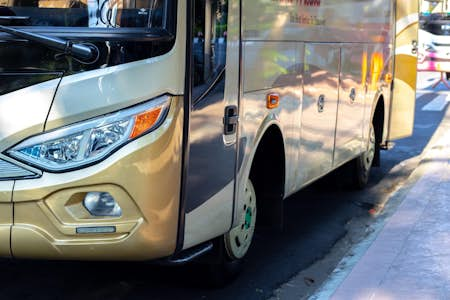Solo travel is a hot topic, and the stats suggest that women are leading the way when it comes to travelling alone.
Travel companies repeatedly find that women, typically older women in their 50s or older, are travelling alone more often.
Whether you're looking for a solo holiday, an adults-only getaway, or an all-inclusive package for the whole family, our selection of holiday providers has you covered. Click below to start your holiday search!
Back in 2018, Lonely Planet found that over-50s women were leading the boom in solo travel across the UK. This trend has continued during the Covid-19 pandemic and is set only to rise.
Of course, now might seem like an odd time to discuss travel, but solo travel is a good fit for the post-Covid travel landscape. TravSolo found that solo travellers value independence now more than ever, especially when it comes to decision making, hygiene and setting travel itineraries.
Solo travel is a bold, adventurous and life-changing experience - an experience many of us are searching for.
Solo travel as a woman: is it as dangerous as people think it is?
Solo travel has a different risk profile from group travel. However, it’s important to remember that solo travel does not necessarily mean travelling purely alone for the duration of the trip.
Singles holidays enable solo travel but in a group. Guided tours also involve groups that are usually accompanied by highly experienced guides and local experts.
On singles holidays and group tours, it’s still vital to take safety and security seriously. Travel Weekly found that some 64% of surveyed women considered safety extremely important when travelling whilst over 80% harboured some form of safety concerns.
The International Travel & Health Insurance Journal found that as little as 15% of women said they always felt secure travelling alone.
Crime statistics surrounding women who travel alone suggest these worries are well-founded. Women are at higher risk of sexual crime and targeted attacks. However, the risk is still exceptionally low in most parts of the world.
Are the risks higher than for male travellers? The stats are murky surrounding violent crime and muggings. However, in terms of sexual violence and harassment, women are at greater risk than men.
Women know this already; they probably deal with it already, too. Moreover, many women point out this is the case regardless of whether they travel or stay at home.
Jennifer Sutherland-Miller writes in her blog Bootsnall:
“The reality we all live with, as women, is that the world is not a completely safe place for us. We all live with the spectre of threat, from the time we are little girls headed to a friend’s house for a sleepover, to the worry of granny attacks in our old age.
We have two choices:
i. To be controlled by that fear.
ii. Or to live our lives in spite of it.
I choose the latter.”
Maybe this is the crux of the issue for women travellers. The moral is one of awareness - to be put off is to accept defeat before encountering any risk. The risks themselves are still exceptionally low, almost nil in some locations.
General statistics don't tell the whole story. For example, you can't compare the risk to solo travellers in a country like Switzerland to El Salvador or Somalia.
Travelling solo in some parts of the world is probably safer than walking through the local park at night. Tragic cases of violence against women, such as Sarah Everard's murder, serve as a stark reminder of this. It's a sad, but true, reality.
In any case, by taking precautions, making good decisions and preparing for every situation, women can tangibly reduce their risk when travelling alone.
It's important to remember that millions of women travel alone without danger or peril every year and will continue to do so.
Solo travel for women: safety 101
Consider singles, group or women-only travel
Firstly, consider what sort of solo travel you’re interested in as there’s more than one type of solo travel.
There are three main options for solo travel as a woman:
- Singles holidays, where you travel as a single person with other singles, usually both men and women. Some of these are specifically tailored for the over-50s or another age group. These are excellent if you're looking to group up with others. Joining a mixed group, both in terms of gender and age, is ideal for those looking to keep their travel experience more open.
- Women-only travel, where you travel with a group of other solo travelling women, couples, or small groups. You'll be with like-minded people - perfect if you don't want to be truly alone.
- Solo travel, where you travel alone, means managing your trip independently. You can still rendezvous with other travellers at tourist spots, but for the bulk of your journey, you'll be alone. It's worth mentioning that you'll rarely be genuinely alone unless you want to go well off the beaten track. Such an approach should only be undertaken by those with significant travel experience.
The approach you choose will depend on what type of holiday you want, where you want to go and your appetite for risk and adventure. For example, if you want to explore more niche or leftfield locations, tours and group travel might be safer. Conversely, if you want to explore tried-and-tested tourist paths or other super-safe locations, then you may not need the security of a group or guide.
For a detailed breakdown of where to travel alone as a woman, see our guide here. The majority of popular solo travel locations are safer than many might think, even across Africa, Asia and South America. Most of Europe and North America is very safe. Some countries like the Nordics and Switzerland are likely safer than your hometown.
Be aware of customs and etiquette
Women are more likely to be adversely affected by local customs than men.
Rhonda Sloan, the Senior Vice-President at AIG Travel, said, "Not knowing local customs, or failing to follow them, might cause female travellers to be the recipients of aggressive behaviour from locals”.
Often, local customs relevant to women relate to the moderation of one’s clothing and skin coverage. Whilst this does apply to men as well as women, women are more likely to draw negative attention than men.
Learning about the local customs of your destination is vital pre-travel. This may affect the way you behave in public as well as the types of clothes you pack.
Whilst you might not directly offend anyone by straying a little from local customs, you may still draw attention to yourself. Blending in with your surroundings is a robust personal security measure in itself.
It's worth mentioning the positive here, too. Women's rights liberation is no longer unique to the Western world; women worldwide are fighting for their right to self-expression to pick and choose what they wear and how they look.
Pack security devices
There are many travel security devices designed for solo travellers.
One of the most revolutionary travel security devices is the portable satellite GPS device.
The Garmin inReach range are some of the most popular GPS devices available. They allow others to track your movements by sending periodical coordinates via satellite - no reception or signal is required.
You can also trigger an SOS response that the GEOS 24/7 global response team will pick up. For any solo traveller attempting a serious solo adventure, GPS tracking devices are essential. For anyone else, they’re an excellent failsafe. Taking it a step further, a satellite phone is suitable for those that need 24/7 communication regardless of where they are in the world - ideal for hardcore solo expeditions.
Besides tracking devices, solo women travellers should consider rape or personal assault alarms, pepper spray, whistles and doorstop alarms. Pepper spray is legal in most countries, but you should always check to ensure it isn't prohibited.
Personal alarms work very well in built-up areas like cities. Doorstop alarms can be wedged underneath doors and will sound upon forceful entry. They’re superb for hostel stays or when the door locks aren’t functional or secure.
Plan in advance
Planning is an important safety measure and will help keep your trip running safely and smoothly.
By planning your movements, you won’t end up in an awkward scenario with nowhere to go. Moving forward in a determined fashion keeps eyes off you - you won’t seem exposed or vulnerable.
Ensure you book accommodation well in advance and aim to book trips, tours and events with reputable brands that are well-reviewed online and in travel communities.
When you’re at your accommodation, learn about your local area, places to go, places to avoid, and anything else you want to know. Local knowledge can be a potent safety tool. In addition, if you can learn some of the local language, that can also help.
Lonely Planet also recommends trusting your gut instinct. If you feel that a situation is uncomfortable or potentially heading in that direction, don't be afraid of taking early evasive action. Whilst paranoia and awareness can seem to blend into one when travelling, it's better to keep an open mind to risk rather than blocking it off entirely.
Be open to meeting others
The kindness of strangers is one of the reasons why solo travel is a life-changing experience.
Many assume that solo travel is a lonely experience, but that isn't true. Read our post here discussing whether it's weird to travel alone.
It's tempting to rant about the risks posed by others, but it's genuinely more likely that your experiences of others will be overwhelmingly positive. Keep an open mind and warm outlook - remaining vigilant doesn’t mean closing up and staying insular.
In fact, the opposite is true. By being pragmatic and forthright where appropriate, you can make both friends and allies.
So long as you stick within the social norms and customs, conversing with strangers, whether local or other travellers, is rarely discouraged.
Remain streetwise
There are some typical situations that solo women travellers should be aware of.
First off, women should be extra vigilant in any situation where they are intoxicated, or others around them are intoxicated. Never leaving drinks unattended is fundamental. This includes both alcoholic beverages and any soft drinks you might be keeping in your bag.
If you choose to go to bars and socialise with others, ensure you're around like-minded individuals. Do your research, and you'll be able to find tried-and-tested traveller's favourites that are renowned for their safety and refuge for women travellers.
Familiarise yourself with emergency protocol
One thing travellers rarely do is learn the emergency protocol and numbers of the countries they’re visiting.
999 and 911 are not the only emergency numbers around the world, though they are the most common. Many countries even have dedicated numbers for tourist police who react specifically to tourist-related emergencies.
Emergency numbers can also vary depending between cities, regions and provinces, so the same number may not work wherever you travel, even in the same country.
Research emergency contact numbers and save them to your phone before you travel. Take a cheap backup phone and save them there, too, along with other contact information for family and friends.
How to travel alone as a woman
Whilst solo travel as a female often conjures images of stress, risk and fear, the risks remain very low, for the most part, depending on where you travel. There are thousands of destinations that are as risky for women as a walk down the park, so don’t be put off by the fear factor of solo travel.
By taking some wise precautions and gearing up properly for your trip, you can safely navigate the perils of solo female travel to enjoy the trip of a lifetime you so desire.
There is genuine cause for optimism, so take stock, do your research and get planning!







